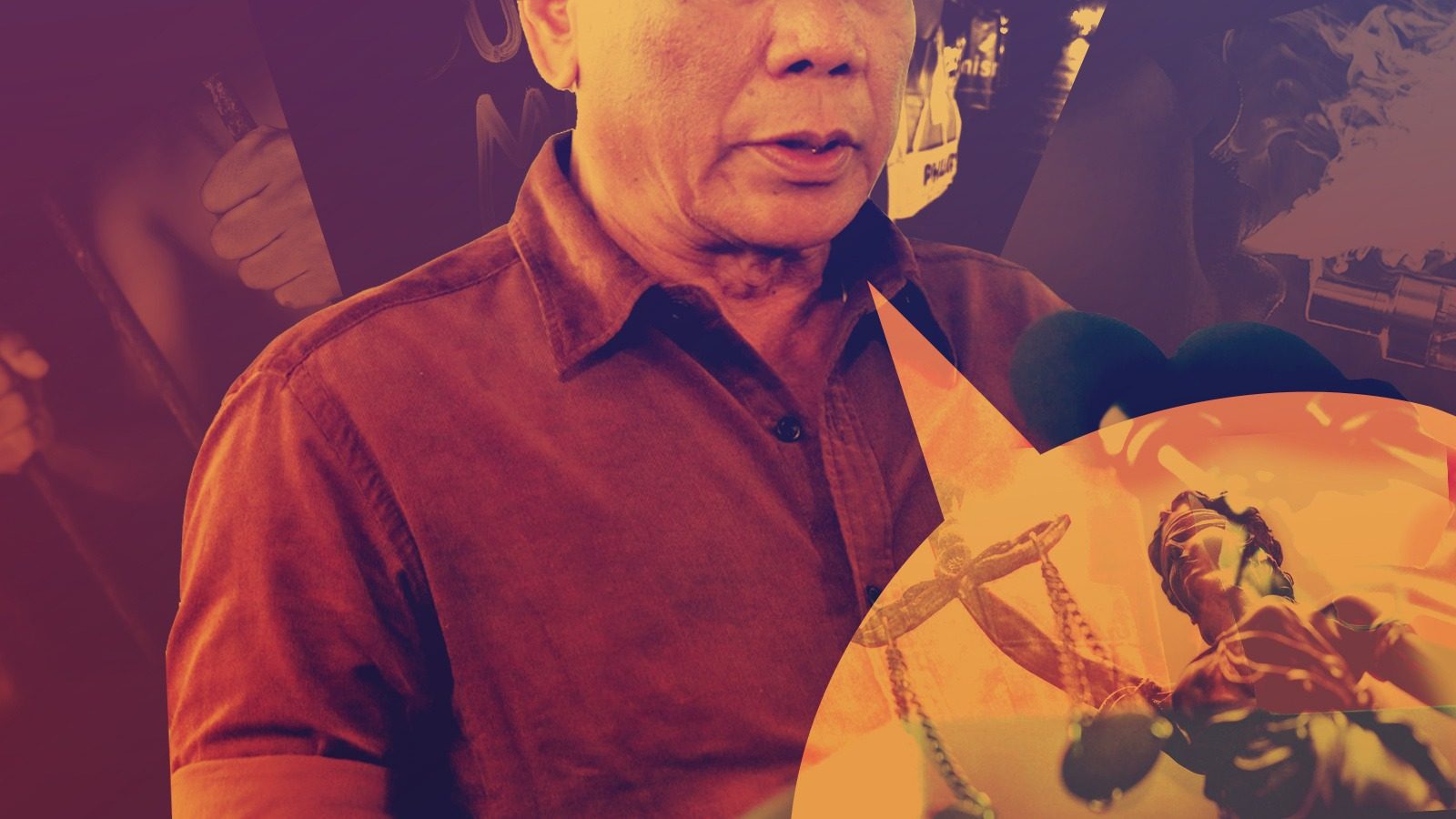SUMMARY
This is AI generated summarization, which may have errors. For context, always refer to the full article.

MANILA, Philippines – The Philippines’ rule of law ranking has been plummeting since 2016, the year Rodrigo Duterte became president. The country’s average annual percentage drop in the last 5 years has been among the biggest dips in the world, according to the World Justice Project (WJP).
In the recently released WJP 2020 Rule of Law index, the Philippines ranked 91st out of 128 in the overall score for “rule of law,” a steady decline in ranking since 2015, when it ranked No. 51.
In 2016, this dropped to No. 70, dipping further to No. 88 in the years 2017-2018, and then slipping to No. 89 in 2019.
The country’s annual average percentage drop since 2015 stood at negative-2.5%, among the worst slides in the world in the 5-year period.
“Over the last five years, countries experiencing the largest average annual percentage drop in the rule of law were Egypt (-4.6 %); Venezuela, RB (-3.9%); Cambodia (-3.0%); Philippines (-2.5%); Cameroon (-2.4%); Hungary (-2.1%); and Bosnia and Herzegovina (-2.1%),” the WJP said.
WJP’s Rule of Law Index covers 128 countries and surveys more than 130,000 households and 4,000 lawyers, supporting its claim that it is the “world’s leading source for original, independent data on the rule of law.” (READ: In fractured justice system, a simple solution: Let’s talk)
The WJP said most of the countries surveyed declined in their overall scores.
“The majority of countries showing deteriorating rule of law in the 2020 Index also declined in the previous year, demonstrating a persistent downward trend. This was particularly pronounced in the Index factor measuring Constraints on Government Powers,” said the WJP.
Poor in ‘fundamental rights’ and ‘criminal justice’
The Philippines’ lowest score in the sub-factors was on the guarantee of the “right to life and security” of Filipinos, where it scored 0.18%, for a ranking of No. 125 out of 128.
These sub-factors fall under the category of “fundamental rights” where the Philippines placed No. 107 out of 128.
The Philippines’ poorest position in the categories was on “criminal justice,” standing at No. 112, because the country had lower scores in the sub-factors under “criminal justice” than under “fundamental rights.”
Under the “criminal justice” category, the Philippines ranked poorest under the guarantee of “an impartial criminal system,” placing No. 123. Across the region, it ranked No. 14 of 15 in that subfactor.
Biggest decline in ‘constraints on government powers’ category
The Philippines’ biggest decline since 2015 was in the category of “constraints on government powers,” which measured accountability of leaders and officials.
The WJP said that this category not only looks at how government officials “are limited and held accountable under the law. It also includes non-governmental checks on the government’s power, such as a free and independent press.”
From a score of 0.61% in this category in 2015, the Philippines tallied only 0.50% in 2020, placing 75th in the world.
The Philippines also steadily declined under the sub-factor that measured whether “government powers are effectively limited by the judiciary.” From a ranking of No. 30 in 2015, it dropped to No. 60 in 2020.
On whether “government powers are effectively limited by the legislature,” the Philippines ranked No. 77 in the world in 2020, way below its No. 38th place in 2015.
On whether “government officials are sanctioned for misconduct,” the Philippines now ranks No. 78 compared to No. 46 in 2015.
Positive scores
Although the Philippine standing in the category of “open government” also slightly dropped in 2020, its scores were among the most steady, and the highest, in the last 5 years.
In 2020, it ranked No. 55 in the world out of 128 in terms of “open government,” its highest category ranking this year.
WJP defined the “open government” category as “the extent to which a government shares information, empowers people with tools to hold the government accountable, and fosters citizen participation in public policy deliberations.”
The Philippines’ highest ranking in all of the sub-factors was the “right to information,” where it placed No. 20 in the world out of 128, and No. 5 in the region out of 15.
The Philippines does not have a Freedom of Information (FOI) Law but the Duterte administration has an FOI executive order that covers the executive branch of government.
But under the Duterte administration, the executive, Congress, the Supreme Court, and even a constitutional body like the Office of the Ombudsman have restricted access to officials’ Statements of Assets, Liabilities, and Net Worth (SALN). – Rappler.com
Add a comment
How does this make you feel?
There are no comments yet. Add your comment to start the conversation.